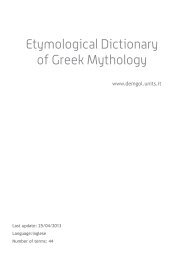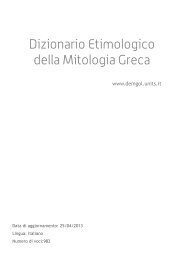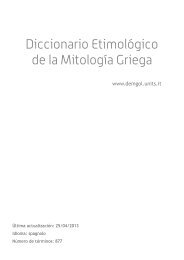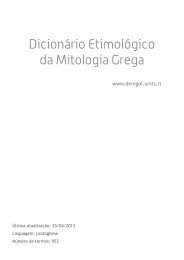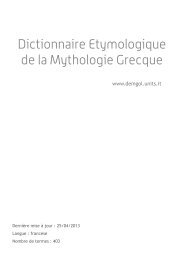Diccionari Etimològic de la Mitologia Grega
Diccionari Etimològic de la Mitologia Grega
Diccionari Etimològic de la Mitologia Grega
Create successful ePaper yourself
Turn your PDF publications into a flip-book with our unique Google optimized e-Paper software.
<strong>Diccionari</strong> <strong>Etimològic</strong> <strong>de</strong> <strong>la</strong> <strong>Mitologia</strong> <strong>Grega</strong> - www.<strong>de</strong>mgol.units.it<br />
von Kamptz, Homerische Personennamen, p. 151 i Scholz, a Snell, Lex. fr. Ep., col. 406). També està atestat el femení<br />
Acasta (Ἀκάστη), nom d'una Oceànida (Hes. Theog. 356).<br />
Ἀχάτης<br />
ACATES<br />
Nom d'un troià que acompanyà Enees fins a Itàlia (Verg. Aen. 1, 120); i d'un tirrè company <strong>de</strong> Dionís (Nonn. Dion. 13,<br />
309; 37, 350).<br />
El nom significa "àgata" i probablement és un manlleu (Chantraine, DELG, s. v.).<br />
Categoria: Persones<br />
Ἀκταίων<br />
ACTEÓ<br />
Fill d'Aristeu i d'Autònoe, criat pel centaure Quiró; fou <strong>de</strong>vorat al Citeró pels seus propis gossos a causa <strong>de</strong> <strong>la</strong> còlera<br />
d'Àrtemis, per haver-<strong>la</strong> vist nua prop d'una font (Hes. Theog. 977; Apollod. Bibl. 3, 4, 4).<br />
Aquest nom podria <strong>de</strong>rivar <strong>de</strong> ἀκτή, "cap, costa escarpada" i significar "el qui viu en un cap".<br />
Categoria: Herois<br />
Ἄκτωρ<br />
ÀCTOR<br />
Heroi tessali, rei <strong>de</strong> Feres, que acollí Peleu i li transmeté el seu reialme en morir (Apollod. Bibl. 1, 7, 3; 8, 2).<br />
Aquest nom és testimoniat ja en micènic en <strong>la</strong> forma A-ko-to (KN Sc 239). Significa "capitost", ja que <strong>de</strong>riva <strong>de</strong>l verb<br />
ἄγω, "conduir" amb el sufix -τωρ típic <strong>de</strong>ls nomina agentis.<br />
Categoria: Herois<br />
Ἀδάμας<br />
ADAMAS<br />
Guerrer troià, participa a l'assalt <strong>de</strong> les muralles <strong>de</strong> Troia combatent al costat <strong>de</strong>l seu pare, el rei Àsios (<strong>de</strong> qui li ve<br />
el patronímic Ἀσιάδη), amb un grup <strong>de</strong> companys, entre els quals Iàmenos, un Orestes, Toones i un Enomau (Hom. Il.<br />
12, 137-140). Després <strong>de</strong> l'intent <strong>de</strong> matar Antíloc, fallit gràcies a <strong>la</strong> intervenció <strong>de</strong> Posidó, que fa inofensiva l'arma<br />
d'Adamas, aquest rep al seu torn una l<strong>la</strong>nça <strong>de</strong>l cretenc Meriones al baix ventre i hi perd <strong>la</strong> vida. (Hom. Il. 13, 560-574).<br />
A ell i altres herois troians els cercarà Hèctor, que els p<strong>la</strong>nyerà <strong>de</strong>sprés juntament amb Paris (Hom. Il. 13, 754-773).<br />
Nom propi <strong>de</strong>rivat <strong>de</strong>l substantiu comú ἀδάμας (Hes. Theog 161, [Hes.] Scut. 137) "acer"), és compost <strong>de</strong>l prefix<br />
privatiu α- i <strong>de</strong>l tema δάμ-, participi en -ντ aquí amb valor passiu. El tema és també molt productiu en diatesi<br />
activa, en tota l'antroponímia grega (cfr. Laodamas, Ifidamas, Quersidamas, Euridamas, Polidamas). Significa doncs<br />
"indomable", "invencible", (Whatelet, Dictionnaire <strong>de</strong>s Troyens n. 9, pp. 167-170). El po<strong>de</strong>m acostar, pel significat, a<br />
Acamas, "l'infatigable" (Ἀκάμας, <strong>de</strong> α- i κάμνω, "fatigar-se", "sofrir"), a qui sovint Adamas és sobreposat; és també<br />
proper per formació als compostos en -τλα (vegeui At<strong>la</strong>s, Von Kamptz, Homerische Personennamen § 28 a 1, p. 83; §<br />
5



